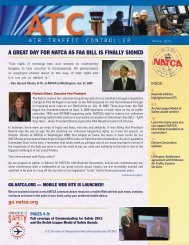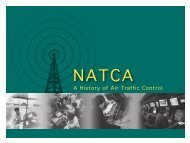Against the Wind - National Air Traffic Controllers Association
Against the Wind - National Air Traffic Controllers Association
Against the Wind - National Air Traffic Controllers Association
You also want an ePaper? Increase the reach of your titles
YUMPU automatically turns print PDFs into web optimized ePapers that Google loves.
from <strong>the</strong> prestigious firm of Covington & Burling,<br />
dickered over money. Although some union members<br />
argued in favor of an across-<strong>the</strong>-board raise for<br />
everyone, McNally refused to turn his back on <strong>the</strong><br />
concept of pay for performance and years of work by<br />
<strong>the</strong> Reclassification Committee.<br />
“There are a lot of controllers in <strong>the</strong> system today<br />
who believe that a controller is a controller<br />
is a controller. No matter how hard you<br />
work, no matter how difficult <strong>the</strong> job you<br />
do, we should all make <strong>the</strong> same amount of<br />
money,” McNally says. “I don’t believe that.<br />
I believe <strong>the</strong>re are logical steps of progression<br />
and of difficulty that should separate<br />
<strong>the</strong> different levels of work we do, and commensurate<br />
with that should be pay. I also believe<br />
<strong>the</strong>re are different parts of <strong>the</strong> country<br />
that have higher costs of living that should be<br />
recognized in order to drive people to those<br />
parts of <strong>the</strong> country. I don’t have <strong>the</strong> magical<br />
answer. But I know reclassification and CIP is<br />
a start in that direction.” *<br />
Many endorse McNally’s beliefs, including<br />
Haines, Forrey and John Leyden, who<br />
fought a similar battle with his PATCO brethren<br />
in <strong>the</strong> 1970s.<br />
“I always was a believer, and paid a heavy political<br />
price for it, that a controller is not a controller<br />
is a controller,” he says. When those who worked at<br />
15<br />
Nov.<br />
The appropriations bill funding <strong>the</strong> Transportation Department for fiscal<br />
1996 becomes law. Two sections of <strong>the</strong> bill mandate that <strong>the</strong> agency institute<br />
new personnel and procurement systems. To help <strong>the</strong> FAA imple-<br />
smaller facilities debated him on <strong>the</strong> issue, Leyden<br />
told <strong>the</strong>m to transfer to Chicago or New York, where<br />
<strong>the</strong>y could earn more money. “No one ever took me<br />
up on my offer,” he says, because <strong>the</strong>y “didn’t want to<br />
go to <strong>the</strong> pressure cooker.”<br />
Fur<strong>the</strong>r talks about money between NATCA<br />
a n d <strong>the</strong> FAA culminated one morning<br />
in early July at a hotel in<br />
Montréal. Seated in a glasswalled<br />
meeting room off <strong>the</strong><br />
lobby, McNally and Herman<br />
countered back and forth<br />
while Krasner and Garvey<br />
watched in silence. Herman<br />
offered $140 million in new<br />
money for pay raises. Saying<br />
<strong>the</strong>y couldn’t accept it, <strong>the</strong><br />
two union officials left <strong>the</strong><br />
room for a break.<br />
“I never in my life believed<br />
that someone would<br />
offer me $140 million and<br />
we would tell <strong>the</strong>m to take<br />
a walk,” Krasner said while<br />
strolling toward <strong>the</strong> lobby. They wandered<br />
into <strong>the</strong> gift shop, where Krasner bought a Cuban<br />
cigar, before returning to <strong>the</strong> meeting. Herman<br />
asked about <strong>the</strong> cigar as Krasner set it on <strong>the</strong> table.<br />
“That’s for when <strong>the</strong> fat lady sings,” he explained.<br />
Chapter 5: The Art of <strong>the</strong> Deal<br />
169<br />
NATCA’s third contract: The 1998 agreement<br />
was <strong>the</strong> first time a controllers’<br />
union negotiated pay with its employer.<br />
The new system tied wages to operational<br />
complexity as well as traffic counts.<br />
* CIP is a cost-of-living premium known as<br />
Controller Incentive Pay, which is awarded to<br />
some facilities based on <strong>the</strong>ir ranking in studies<br />
conducted by Runzheimer International.<br />
ment <strong>the</strong>se reforms, <strong>the</strong> bill exempts agency employees from key workers<br />
rights under Title 5 of <strong>the</strong> United States Code, effective April 1, 1996,<br />
which would strip <strong>the</strong> union of its powers as a labor group.




